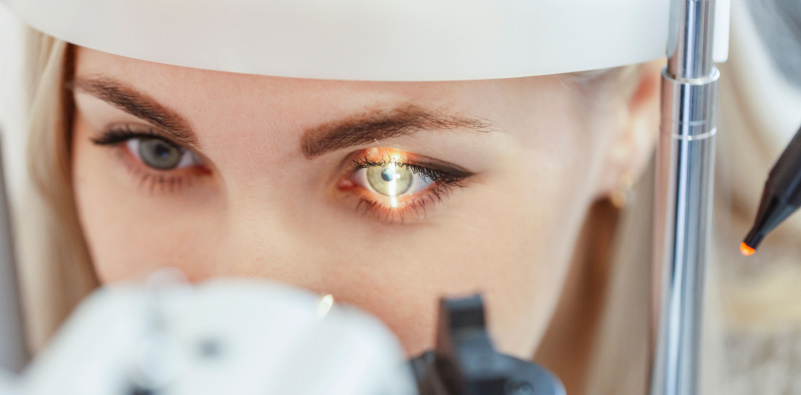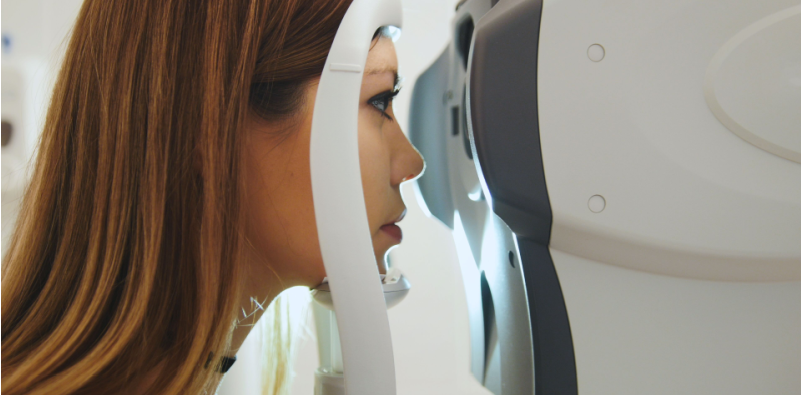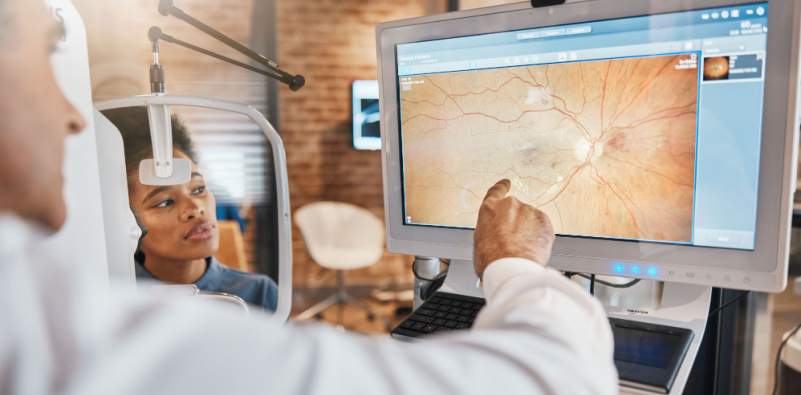Why have advanced retinal imaging with an eye exam?
If you want to have healthy eyes and clear vision for as long as possible, you should look after your eyes in whatever way you can, especially as you get older, as a lot of eye diseases occur as you age. Eye examinations are a crucial element in maintaining good eye health and vision, and including retinal imaging can help provide vital information to our optometrists about your eyes. Read on to find out why we recommend including retinal imaging in your eye exam.
A look at the retina
Your eyes are complex and miraculous organs that allow you to see, and your retina plays an important role in the smooth functioning of your vision. Situated at the back of your eyes, they contain millions of light-sensitive cells that absorb the light that comes in through your eyes. These cells send information to your brain via the optic nerve, which is converted into images – the process that enables you to see.
An unhealthy or damaged retina cannot send clear messages to your brain, which results in impaired vision. It goes without saying, then, that it’s essential to care for your eyes by taking the right steps to ensure you can spot and manage any problems before they cause any significant damage.
Thankfully, advances in technology mean it’s now easier than ever for our optometrists to examine the retina in detail and identify any changes or problems early on.
Advanced retinal imaging
Advanced retinal imaging helps our optometrists assess the health of the back of your eyes and pinpoint certain diseases or conditions you may be developing.
Even very slight changes to the tissue structures can be an early warning of a variety of eye diseases, including diabetic retinopathy, macular degeneration, retinal detachment and tears, hypertension, and glaucoma.
Optomap retinal imaging
At Optikal Opticians, we invest in the best diagnostic equipment to ensure we can continue to provide you gold standard eyecare.
Optomap retinal imaging is an incredible scan that enables us to take an ultra-wide image of the back of your eye. This ultra-wide field scan captures up to 82% of your retina whereas traditional imaging technology typically only captures 15%. Using these images our optometrists are able to thoroughly assess your retinal health and see any potential problems straight away in areas that are not usually visible during a routine eye exam or older retinal photography.
It’s a non-invasive, painless scan and takes less than a second – all you have to do is rest your chin against the machine and look into the camera, and it’ll do thehard work for you.
This high-quality image is available straight away for review and your optometrist will be able to zoom in to examine it and give you an in depth analysis of their findings for your peace of mind.
OCT eye scan
An OCT eye test is another brilliant piece of technology we use to assess the health of your retina, and one of the most advanced retinal scans available. Working similarly toan MRI scan of the brain taking. the OCT takes multiple, cross sectional images of all the retinal tissue layers at the back of your eye using light waves, to create one 3D image.
Again, it’s a non-invasive, quick scan, which produces instantaneous results that can be examined and discussed immediately. While the Optomap shows a wide-field view of your eyes, the OCT eye scan allows us to see each retinal layer in unprecedented detail to pinpoint exact areas where changes or abnormalities have occurred. We can also see the thicknes of all these individual layers, which can also help us to see if something isn’t quite right.
Benefits of having advanced retinal imaging
Advanced retinal imaging is a recommended addition to a regular eye examination. It enables our optometrists to get a much more comprehensive and accurate picture of your eye health, which means the slightest changes can be picked up sometimes even 5 year earlier than they would have been with a routine eye exam. This means further tests and treatment for a variety of conditions and diseases can start as early as possible.
These scans are particularly important if you’re in a higher-risk category for certain conditions. People with a family history of glaucoma and diabetics are advised to include advanced retinal imaging with their regular eye examinations – this can pick up early signs of glaucoma and diabetic retinopathy before any noticeable symptoms occur.
As you get older, you become more prone to developing eye conditions that can lead to impaired vision in the future. It makes it even more important to get a thorough and detailed examination that includes retinal imaging.
Who can have advanced retinal imaging?
Both Optomap retinal imaging and OCT eye tests are suitable for all ages. They’re both quick, non-invasive and pain-free, and we’ll make sure you’re comfortable throughout the examination.
Advanced retinal imaging is available at each of our opticians in Potters Bar, Finchley, and Temple Fortune – simply ask one of our team to add it to your regular eye exam. Additionally, your optometrist may advise adding it if they want to carry out a more detailed assessment of your eye health during a regular eye exam.
Your eyesight is precious. Taking good care of it will help ensure you enjoy good vision for as long as possible. Book your eye exam with advanced retinal imaging today.




